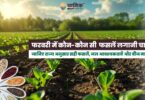
India is one of the largest producers of wheat in the world, accounting for approximately 15% of global wheat production. However, with the onset of climate change, the country is likely to face significant challenges in maintaining its wheat productivity.
Rising temperatures and changes in rainfall patterns are expected to negatively impact wheat production in India. According to a study published in the journal Environmental Research Letters, a 1-degree Celsius increase in temperature during the wheat-growing season could reduce wheat yields in India by as much as 7%.
This reduction in wheat production could have serious implications for food security in the country, as wheat is a staple food for a large proportion of the population. It could also have economic consequences, as India is a major exporter of wheat.
To mitigate the impact of climate change on wheat production, Indian farmers need to adopt climate-resilient agricultural practices. This includes the use of greenhouses, drought-resistant and heat-tolerant crop varieties, the implementation of efficient irrigation systems, and the adoption of conservation agriculture techniques such as zero-tillage farming and crop rotation.
In addition, farmers can also make use of weather forecasting technologies to plan their crop cycles and irrigation schedules. This can help them to avoid planting during periods of high heat and drought, and to conserve water during periods of low rainfall.
The Indian government has also launched several initiatives to support farmers in adapting to climate change. These include the Pradhan Mantri Fasal Bima Yojana, which provides insurance coverage to farmers against crop losses due to natural calamities, and the Paramparagat Krishi Vikas Yojana, which promotes organic farming and soil health management practices.
In conclusion, early heat climate change is likely to have a significant impact on wheat production in India.

Post Views: 193







Leave a Comment